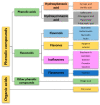Genista tridentata Phytochemical Characterization and Biological Activities: A Systematic Review
- PMID: 37997986
- PMCID: PMC10669091
- DOI: 10.3390/biology12111387
Genista tridentata Phytochemical Characterization and Biological Activities: A Systematic Review
Abstract
Genista tridentata (L.) Willk., known as "prickled broom", is a Leguminosae (Fabaceae) species native to the Iberian Peninsula, Morocco, Algeria, and Tunisia. It is used in folk medicine as an anti-inflammatory, for gastrointestinal and respiratory disorders, rheumatism, and headaches, to lower blood pressure, against hypercholesterolemia and hyperglycemia. This study aimed to systematically review the literature on the bioactivities and phytochemical profile of Genista tridentata to understand its pharmacological potential. For this, four electronic databases (PubMed, GoogleScholar, Repositórios Cientificos de Acesso Aberto de Portugal (RCCAP), and ScienceDirect) were searched from inception up to 31 December 2022. From a total of 264 potentially eligible studies considered for screening, 34 papers were considered eligible for this systematic review. The sampling included 71 extracts, collected mainly in Portugal. Genista tridentata extracts present a high level of flavonoids and phenolic compounds. The flowers and aerial parts of the plant were the most studied, and aqueous extracts were the most used. The results predict a high potential for the application of Genista tridentata as a new source of natural antioxidants and preservatives for the food industry with subsequent health benefits, such as the production of nutraceuticals. Moreover, the results indicate that the plant can be collected at all seasons of the year, which represents a benefit for the industry.
Keywords: Genista tridentata; Pterospartum tridentatum; biological properties; nutraceuticals; phytochemicals; traditional medicine.
Conflict of interest statement
The authors declare no conflict of interest.
Figures
References
-
- Demasi S., Caser M., Donno D., Enri S.R., Lonati M., Scariot V. Exploring wild edible flowers as a source of bioactive compounds: New perspectives in horticulture. Folia Hortic. 2021;33:27–48. doi: 10.2478/fhort-2021-0004. - DOI
-
- Coelho M.T., Gonçalves J.C., Alves V., Moldão-Martins M. Antioxidant activity and phenolic content of extracts from different Pterospartum tridentatum populations growing in Portugal. Procedia Food Sci. 2011;1:1454–1458. doi: 10.1016/j.profoo.2011.09.215. - DOI
Publication types
Grants and funding
LinkOut - more resources
Full Text Sources
Molecular Biology Databases



